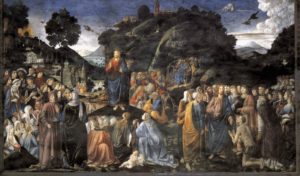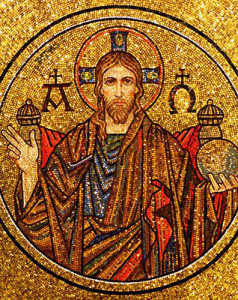I Know Who You Are
A sermon preached by Christopher L. Webber at All Saints Church, San Francisco, on January 28, 2018
“I know who you are!”
I take my text from a crazy man. He came to Jesus, the Gospel tells us, and said, “I know who you are: the Holy One of God.” Sometimes you have to be crazy to make sense of the world around us. Sometimes you have to be crazy to understand.
I read a book once by Jacob Neusner, a rabbi who imagined how it might have been if he had been there in Galilee listening to Jesus himself. He imagined himself being very impressed but turning and walking sadly away – sadly unable to commit to a teaching so radical. I understand that. I might  have turned away myself. It’s a commitment to be a Christian. “Take up your cross,” Jesus said, “and follow me.” Maybe next week, but right now I’m busy. Got to write a sermon. You’d have to be crazy to be a Christian.
have turned away myself. It’s a commitment to be a Christian. “Take up your cross,” Jesus said, “and follow me.” Maybe next week, but right now I’m busy. Got to write a sermon. You’d have to be crazy to be a Christian.
It took a crazy man to see who Jesus was – and is. “I know who you are: the Holy One of God.” Think about that. Think about holiness. What is he saying? What is he seeing? “The Holy One of God.” Read the Hebrew Scriptures: it’s the story of a discovery of holiness and especially the discovery of the great divide between holiness and humankind. God set out to create a people who could understand holiness, who could see beyond the mundane daily-ness of life, who could see another dimension, who could glimpse a reality beyond reality, who could recognize a reality too great for human beings to comprehend. And that’s hard to do.
At the simplest level, the problem is called sin. It’s called separation. It’s called failure. It’s called missing the mark. It’s called being human. “To err is human.” That’s a familiar phrase. The Bible is the story of the development of that understanding also: knowing what holiness is and knowing who we are and knowing how far we are from a reality beyond words, another dimension, something beautiful and dangerous, something that draws us, that fascinates us, yet terrifies us with its demand that we change, that we change, that we be changed, that we not settle for what we are, that we set out to become something more, something new, something other, something – holy. That’s frightening.
Holiness is frightening. Most religions find a way to tame it down, to domesticate it, to make it safe. Take a familiar prayer book, add some sentimental hymns, get a friendly pastor to reassure you. But then you come to church and they read you some crazy passage about a weird encounter on a hilltop in the middle east between the friendly Jesus you learned about in Sunday School and a crazy man who was yelling and screaming about Jesus being the Holy One of God. But if God were standing in front of you in human form wouldn’t that be scary? Wouldn’t you be scared? terrified? You would have to be crazy to face it because if it’s true, life is changed for ever.
I wonder whether you went to a college as I did and took a course that asked you to read a book written a hundred years ago by a man called Rudolf Otto. Otto was German, so he wrote in German and the German title is “Das Heilige.” In English, it’s called, “The Idea of the Holy.” If I had to make a list of the ten most important books I have read, “The Idea of the Holy” would be on it. Otto writes about “the elements of mystery, fascination, awfulness, and energy.” He talks about “the wholly other” and the “mysterium tremendum.” We are told that colleges today need to emphasize a “STEM curiculum” (Science, Technology, Engineering, and Math) so maybe nobody reads Otto  any more. What about poetry? Do you read poetry? Do you go to museums, do you study the great artists, Rembrandt and Picasso, do you listen to music – any music – thoughtfully? Do you ask why the organ back there is so important to our worship, our common life? Otto says, “Religious worship cannot do without music – it stands too high for any understanding to reach.” We respond automatically to so much of this because of who we are – human beings, made in the image of God, the image of the Holy One. So it’s good to think about all this, and to ask why, to ask about the things that separate us from the dog on a leash or the bird on a wire. They need no higher education to be what they are nor do we, but to be what we might become: that’s something else. And it’s not necessarily higher education we need, certainly not a STEM curriculum, but some degree of self-awareness, that we are a flame in a fragile shell with “intimations of immortality” – that’s Shelley – that “There’s a divinity that shapes our ends” – that’s Shakespeare. We need glimpses of something more, but something all too easily ignored, put aside for a later day that never seems to come: glimpses of that frightening, terrifying aspect of life that Otto called “the wholly other.” Otto wanted to explore that sense we have that there’s another dimension, that the life we live day by day is only the surface of something more. But it might be frightening to do that and we can usually postpone it to another day.
any more. What about poetry? Do you read poetry? Do you go to museums, do you study the great artists, Rembrandt and Picasso, do you listen to music – any music – thoughtfully? Do you ask why the organ back there is so important to our worship, our common life? Otto says, “Religious worship cannot do without music – it stands too high for any understanding to reach.” We respond automatically to so much of this because of who we are – human beings, made in the image of God, the image of the Holy One. So it’s good to think about all this, and to ask why, to ask about the things that separate us from the dog on a leash or the bird on a wire. They need no higher education to be what they are nor do we, but to be what we might become: that’s something else. And it’s not necessarily higher education we need, certainly not a STEM curriculum, but some degree of self-awareness, that we are a flame in a fragile shell with “intimations of immortality” – that’s Shelley – that “There’s a divinity that shapes our ends” – that’s Shakespeare. We need glimpses of something more, but something all too easily ignored, put aside for a later day that never seems to come: glimpses of that frightening, terrifying aspect of life that Otto called “the wholly other.” Otto wanted to explore that sense we have that there’s another dimension, that the life we live day by day is only the surface of something more. But it might be frightening to do that and we can usually postpone it to another day.
Did you ever read C S Lewis’ children’s book, “The Lion, the Witch, and the Wardrobe”? The children in the story have somehow gotten beyond the surface and crossed into a magical land where everything is strange and they are told that they need to meet the ruler of that land, Aslan, the Lion King. Susan asks, “Is he – quite safe? I shall feel rather nervous about meeting a lion”… “Safe?” said Mr Beaver …”Who said anything about safe? ‘Course he isn’t safe. But he’s good. He’s the King, I tell you.” Not safe, but good. He’s holy. He’s that frightening power that draws us, and he’s frightening, maybe, because we’ve gotten so far afield. Like MacBeth, we’ve come “so far from shore returning were as tedious as go o’er.” But what would happen if we decided to go the rest of the way? What would happen if we fanned the spark into a flame?
Now if you’re paying attention, you may have noticed that I’ve been looking at the other side of the text. The mad man in the Gospel today was accosting Jesus, recognizing the holiness in Jesus, and I’m suggesting that there is a holiness also in us, in you and me. I think that’s what Jesus is all about: he came to show us holiness in human life. You may need to be slightly crazy to see it, but I think it’s why Jesus came and I think it’s why we’re here. An image that came to mind was “like moths drawn to the flame that can destroy us.” It’s dangerous, what we’re doing here, and yet we try to make it safe, to tell people about a friendly Jesus and invite them to a comfortable church where they can meet friendly people. I think this church is different. It is comfortable and the people are friendly, but I don’t think that’s why we’re here. I think there’s something more.
I came here last Sunday and a few minutes before ten o’clock the organ prelude began, a simple melody, one note at a time, the melody of a familiar hymn, but then a few chords were added and then some discords and more stops were opened and the melody ramified at last into a complexity of sound, a storm of sound, that washed over me, beyond analysis, beyond understanding, but conveying somehow a sense of a mystery beyond words and requiring worship. There are many paths to that sense of the holy. Music is one of them. Incense and vestments and silence are also part of it. There are paths we need to follow, country we need to explore, to know who we are and why we are here and all the outward show is dedicated to that purpose.
The third book of the Bible is called Leviticus and most people never read it – understandably. I recommend Rudolf Otto; I don’t recommend Leviticus. Leviticus begins with specific instructions on how to sacrifice cattle, how to make a burnt offering of sheep or goats. Why would you do that? Well, you might do it because you have a sense of mystery, and blood and death bring you close to that mystery. Then there are dietary laws. Well, we all know about dietary laws: calorie counting and all that. God gave you a body and you need to take care of it. We know that. Leviticus knows that. We have something in common. But keep on going. There’s stuff about sex – well, that’s terrifying also. But it also holds a potential for deep levels of love and a sense of the holy. Keep going and finally in chapter 19 you come to what is known as “The Holiness Code” and one of the most important chapters in the whole Bible. Verses one and two say it all: “The Lord spoke to Moses saying, ‘Speak to the whole community and say to them: You shall be holy, for I the Lord your God am holy.’” The Holiness Code goes on to provide a whole series of instructions about respect for the elderly – more important to me every year – and about leaving some of your harvest for the poor and not insulting the deaf or putting something in the way of the blind for them to trip over and not dealing falsely with others and not sowing two kinds of seed in one field and not turning to ghosts or soothsayers and trimming your beard in a certain way and tucked in with all of that is the commandment to love your neighbor as yourself, and we should do all of that in order to be holy because the Lord our God is holy. We are to come near to the awesome and terrifying mystery at the heart of creation and let that holiness transform us and make us new, make us like God.
There are sixteen Episcopal churches in San Francisco and how many Lutheran and Presbyterian and Methodist and Roman Catholic and Orthodox and other? And yet I read in the paper last week of a United Nations emissary visiting the homeless encampments in Oakland and Berkeley and San Francisco. “She met with dozens of homeless people — many disabled, elderly, veterans, chronically ill, and suffering from addictions — and she  witnessed families with children camping in the 41 degree weather. At a camp in the San Antonio neighborhood, she watched large rats scurry in the mud looking for food scraps. While homelessness is an international crisis, in several respects, she said, the situation in California’s cities is worse than other parts of the world. “I find there to be a real cruelty in how people are being dealt with here,” she said.
witnessed families with children camping in the 41 degree weather. At a camp in the San Antonio neighborhood, she watched large rats scurry in the mud looking for food scraps. While homelessness is an international crisis, in several respects, she said, the situation in California’s cities is worse than other parts of the world. “I find there to be a real cruelty in how people are being dealt with here,” she said.
You shall be holy: you shall be a transforming fire. What would a mad man say? Would he see what we fail to see? Do we know who they are? Do we see the holy there on the street? Do we see the holiness: that flame, that essential core of our being that we somehow are able to stifle and starve and beat down until all we see is the battered shell of a human life – maybe a homeless woman or man and maybe our own.
Jesus came specifically for this purpose: to be recognized as God’s holy one and to let us see who we are called to be, to call out the holiness in you and me so we can come home at last to the Holy God who made us for that end.
I know who you are. Do you?
 Christopher L. Webber
Christopher L. Webber